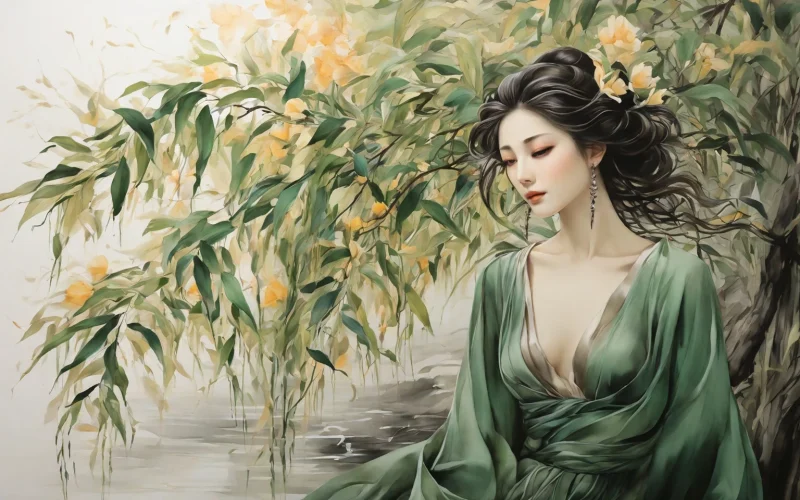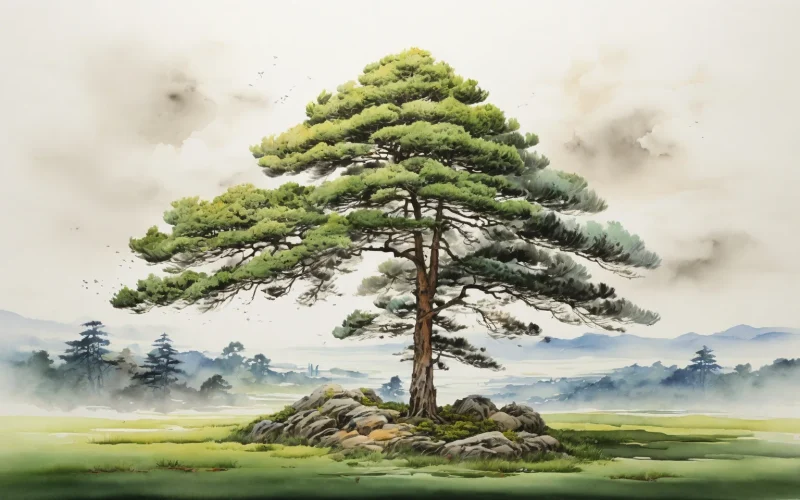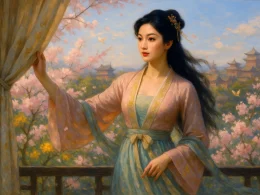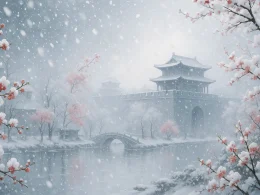Flirting with vernal breeze, the willow sways so tender.
Who in the world can vie with it but the waist slender?
It is planted at random by the riverside.
How many maids fond of its leaves of hunger died?
Original Poem
「垂柳」
杜荀鹤
绊惹春风别有情,世间谁敢斗轻盈?
楚王江畔无端种,饿损纤腰学不成。
Interpretation
This heptasyllabic quatrain employs the weeping willow as a metaphor to critique the political corruption and social injustice of the late Tang Dynasty. By connecting the willow's grace with the historical anecdote of King Ling of Chu's obsession with slender waists, the poet expresses disdain for feudal rulers' absurd whims and satirizes the culture of sycophancy.
First Couplet: "绊惹春风别有情,世间谁敢斗轻盈?"
"Bàn rě chūnfēng bié yǒuqíng, shìjiān shéi gǎn dòu qīngyíng?"
Entwined with spring breeze, it dances with unique grace - What in this world dares challenge its lightness of pace?
The opening personifies the willow's wind-swaying elegance. "Entwined" vividly captures its lingering charm, while the rhetorical question emphasizes its peerless grace, creating a scene of natural beauty that carries subtle critique.
Second Couplet: "楚王江畔无端种,饿损纤腰学不成。"
"Chǔ wáng jiāng pàn wúduān zhǒng, è sǔn xiān yāo xué bù chéng."
By Chu king's riverside planted without design, Starved waists failed to mimic its slender line.
The couplet references King Ling of Chu's cruel decree that made palace ladies starve for slender waists. The "planted without design" suggests how rulers' casual whims spawn tragedies, while "starved waists failed" exposes the futility of blind conformity. The critique is delivered through historical lament.
Holistic Appreciation
This is not merely a nature poem celebrating beauty, but a politically charged allegory with profound social critique. The opening couplet depicts the willow's delicate grace and dancing charm, using movement to accentuate stillness, revealing its unique poetic allure. The latter lines abruptly pivot, invoking King Ling of Chu's infamous "love of slender waists" to satirize the absurd whims of the powerful and the fawning sycophancy of their courtiers. Through stark contrast between the willow's elegance and the king's caprice, the poet exposes feudal society's blind conformity and senseless sacrifices—terse yet deeply suggestive, lingering in the reader's mind.
Artistic Merits
The poem employs symbolic representation, using the willow's form to reflect societal realities with layered meaning. Personification breathes life into the willow, endowing it with ethereal vitality for vivid imagery. The language is subtle yet piercing—ostensibly praising the willow while actually skewering elite absurdity and mindless flattery, embedding satire within apparent admiration. Its concise phrasing belies profound intent, epitomizing the Late Tang poets' art of indirect expression and circuitous critique.
Insights
This poem enlightens us: beauty should be appreciated, not blindly emulated. The careless whims of those in power often trigger mindless imitation, leading to needless sacrifice. Individuals must maintain independent thought, while society should honor the value of each life, avoiding tragedies born from chasing illusory ideals or authoritarian whims. Simultaneously, the willow's graceful poise reminds us to discern nature's beauty in daily life, drawing from it life's truest wisdom.
Poem translator
Xu Yuanchong (许渊冲)
About the Poet
Tang Yanqian (唐彦谦, 848 - 915), a late Tang dynasty poet, was born in Taiyuan, Shanxi. His poetry synthesizes the influences of Li Shangyin and Wen Tingyun, excelling particularly in seven-character regulated verse and quatrains. Characterized by ornate craftsmanship, his works are renowned for their vivid depictions of objects and romantic themes.












